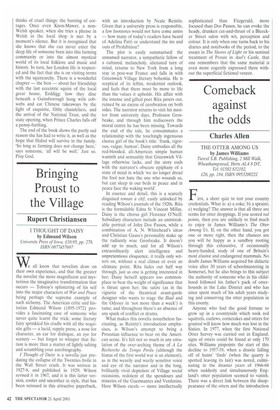Bringing Proust to the Village
Rupert Christiansen
I THOUGHT OF DAISY by Edmund Wilson University Press of Iowa, £10.95, pp. 278, ISBN 0877457697 We all know that novelists draw on their own experience, and that the greater the novelist the more magnificent and mysterious the imaginative transformation that occurs — Tolstoy's splintering of his self into the major characters of War and Peace being perhaps the supreme example of such alchemy. The American critic and historian Edmund Wilson (1895-1972) provides a fascinating case of someone who never quite learnt the trick: some literary fairy sprinkled his cradle with all the requisite gifts — a lucid, supple prose, a nose for character, an ear for dialogue, an eye for scenery — but forgot to whisper that fiction is more than a matter of lightly salting and scrambling your autobiography.
I Thought of Daisy is a novella just predating the collapse of the Twenties frolic in the Wall Street crash. It was written in 1927-8, and published in 1929; Wilson revised it in 1967, and it is this latter version, cooler and smoother in style, that has been reissued in this attractive paperback, with an introduction by Neale Reinitz. Given that a university press is responsible, a few footnotes would not have come amiss — how many of today's readers have heard of Adelina Patti or understand the ins and outs of Prohibition?
The plot is easily summarised: the unnamed narrator, a sympathetic fellow of a cultured, melancholy, alienated turn of mind, returns to New York from a long stay in post-war France and falls in with Greenwich Village literary bohemia. He is sceptical of its leftist, modernist outlook, and feels that there must be more to life than the values it upholds. His affair with the intense and gifted poet Rita peters out, ruined by an excess of cerebration on both sides. The narrator returns to visit his mentor from university days, Professor Grosbeake, and through him rediscovers the moral centre he has been missing. Towards the end of the tale, he consummates a relationship with the touchingly ingenuous chorus girl of the book's title: 'frank, vigorous, vulgar. human', Daisy embodies all the red-blooded, all-American simple human warmth and sensuality that Greenwich Village otherwise lacks, and the story ends with the narrator's obscure epiphany of a state of mind in which 'we no longer dread the fool nor hate the one who wounds us, but can sleep in our beds in peace and in peace face the waking world'.
In essence and detail, this is a scarcely disguised roman a clef, easily unlocked by reading Wilson's journals of the 1920s. Rita is the formidable Edna St Vincent Millay, Daisy is the chorus girl Florence O'Neill. Subsidiary characters include an unmistakable portrait of John Dos Passos, while a combination of A. N. Whitehead's ideas and Christian Gauss's personality make up the radiantly wise Grosbeake. It doesn't add up to much, and for all Wilson's extraordinarily alert intelligence and unpretentious eloquence, it really only witters on, without a real climax or even an ultimate point. Rita fades out half way through, just as one is getting interested in her; Daisy herself appears too commonplace to bear the weight of significance that is thrust upon her; the satire (as in the vignette of the theatrical avant-garde designer who wants to stage the Iliad and the Odyssey in `not more than a week') is tame; and throughout there's an absence of any spark of conflict or drama.
What makes this novella nonetheless fascinating, as Reinitz's introduction emphasises, is Wilson's attempt to bring a Proustian influence to bear on the American scene. It's felt not so much in any emulation of the over-arching theme of A La Recherche du Temps Perdu (although the hiatus of the first world war is an element), as in the wearily and warily sensitive voice and eye of the narrator and in the long, brilliantly vivid depiction of Village social occasions, redolent of the spendours and miseries of the Guermantes and Verdurins. Here Wilson excels — more intellectually
sophisticated than Fitzgerald, more focused than Dos Passos, he can evoke the heady, drunken cut-and-thrust of a Bleecker Street salon with wit, perception and colour. It is only when one turns back to his diaries and notebooks of the period, to the essays in The Shores of Light or his seminal treatment of Proust in Axel's Castle, that one remembers that the same material is even more cogently expressed there without the superficial fictional veneer.


































































 Previous page
Previous page